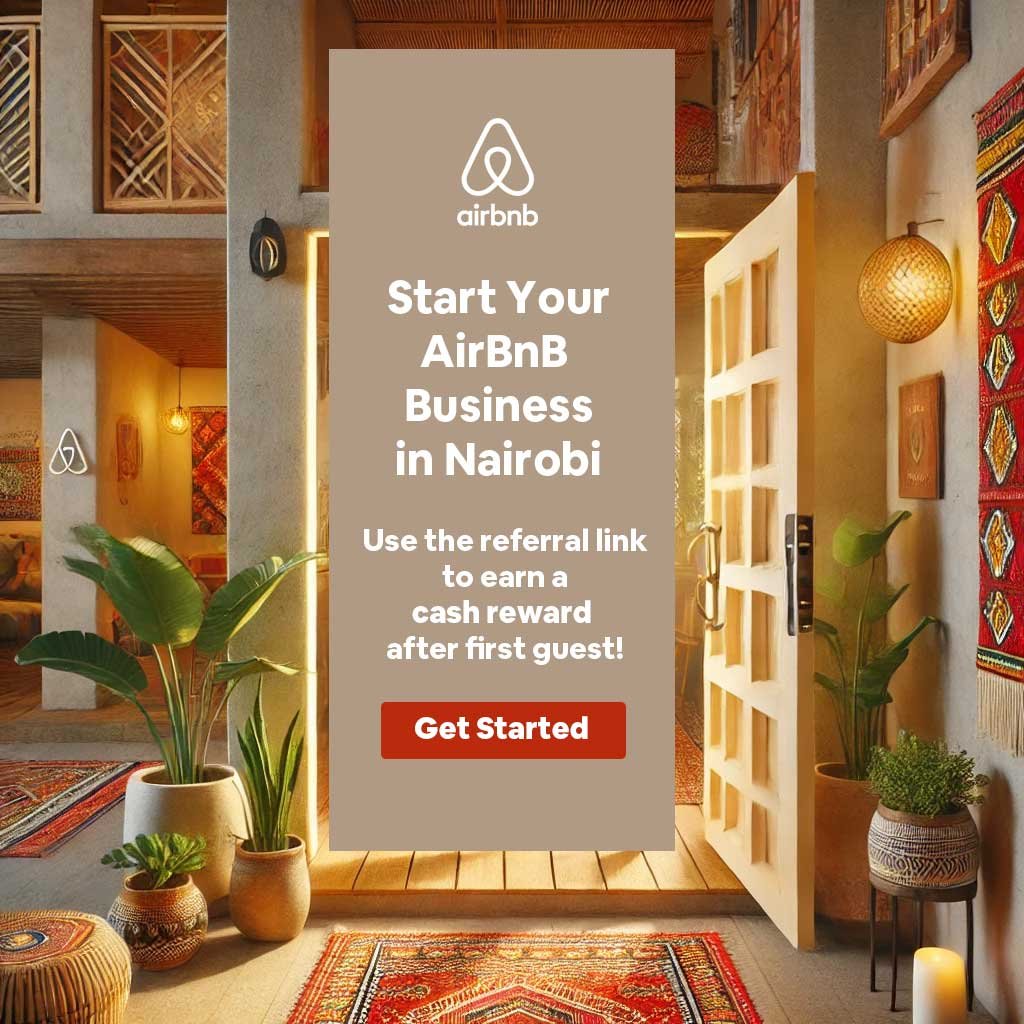Thinking of starting to host on Airbnb in Nairobi? Before you dive in, it’s important to know that hosting an Airbnb is a serious business venture—and should be treated as such.
Setting up an Airbnb isn’t as simple as snapping a few photos and posting a listing. It requires significant time and effort, including thorough research on Nairobi’s short-term rental market, understanding complex regulations and taxes, and preparing your property thoughtfully to attract and satisfy guests.
Starting an Airbnb business in Nairobi—or anywhere in Kenya—offers the potential to create a profitable stream of income, but it requires strategic planning and preparation. Here’s how you can tailor your approach to popular Nairobi neighborhoods like Kilimani, Roysambu, Embakasi, Parklands, Lavington, and Kileleshwa.

Roysambu: Offers affordable rental units popular with university students and young professionals:



Lavington and Kileleshwa: Ideal for families and guests seeking tranquility and luxury:

2. Check Regulations and Legal Requirements
Different neighborhoods may have distinct regulations related to short-term rentals. Be sure to:
-
Review zoning laws and confirm if vacation rentals are permitted.
-
Check homeowners’ association rules if applicable.
-
Obtain permits if necessary and confirm with mortgage providers.
3. Create a Business Plan
A comprehensive business plan helps guide your Airbnb venture. Include the following:
-
Executive Summary: Outline your goals and key points.
-
Market and Customer Analysis: Highlight demand in areas like Kilimani and Westlands.
-
Operations Plan: Detail daily management tasks.
-
Marketing Plan: Specify how you’ll attract guests with online promotions and SEO tactics targeting phrases like “Kilimani vacation rentals” or “luxury Airbnb in Lavington.”
-
Financial Plan: Provide a budget and projected revenue based on local rental data.
4. Set Up a Legal Entity
Forming a legal entity, such as a Limited Liability Company (LLC), can protect your personal assets and offer tax advantages. Ensure that your documentation meets local requirements and includes permits and registrations.
5. Understand Your Tax Obligations
Short-term rental income in Nairobi is subject to taxes, including rental income tax. Track your expenses meticulously, as items like maintenance and insurance may be deductible. Consult a tax professional familiar with Kenyan tax regulations to stay compliant.
6. Get the Right Insurance
While Airbnb offers Host Protection Insurance, additional coverage is recommended, such as:
-
Vacation Rental Insurance: Covers damages and liability.
-
Business Income Insurance: Provides coverage if your property becomes temporarily uninhabitable.
-
Worker’s Compensation Insurance: If you hire staff for cleaning or maintenance.
Ensure policies are registered under your business name.
7. Prepare Your Property for Guests
Tailor your space to attract guests based on the neighborhood:
-
Kilimani: Highlight chic décor and convenience for digital nomads.
-
Roysambu: Emphasize affordability and proximity to universities.
-
Embakasi: Promote ease of airport access and transport links.
-
Parklands: Focus on business-friendly amenities such as Wi-Fi and dedicated workspaces.
-
Lavington and Kileleshwa: Showcase luxury furnishings, smart home features, and serene outdoor spaces.
Other essentials include:
-
Smart Locks and Keypads: To provide seamless self-check-in.
-
Stocked Kitchens and Toiletries: Offer basic necessities and extras like coffee and snacks.
8. List Your Property
Create a standout listing by using high-resolution photos that capture your property’s best features. If you dont have a good camera on your phone try to ask a friend or hire a professional photographer! Writing a catchy, descriptive title (e.g., “Modern Studio in Kilimani with Rooftop Views”). Including details about nearby attractions, such as Nairobi National Park or shopping hubs like The Junction Mall. Optimizing your listing with keywords such as “Nairobi vacation rentals,” “affordable Airbnb in Embakasi,” or “Parklands short-term stay.”
Consider listing on additional platforms like Booking.com and Vrbo to increase your visibility.
Airbnb Welcome Basket: Ideas to Wow Your Guests in Kenya

Creating a Kenyan-themed Airbnb welcome basket is a thoughtful way to make a lasting first impression. Here are some locally inspired ideas to include:
-
- Local Snacks and Beverages: Add Kenyan treats like roasted macadamia nuts, Kenyan tea from Kericho or Chai Masala, and a small bag of locally roasted coffee from Nairobi or Nyeri.
-
- Artisanal Chocolates: Include premium chocolates made by Kenyan chocolatiers like “65 Percent” or other local brands.
-
- Savory Delights: Packets of dried mango slices, biltong (dried meat), or samosa crisps for a savory snack.

-
- Self-Care Items: Add handmade soaps, body oils, or bath salts infused with essential oils like eucalyptus or lemongrass from local producers.
-
- Local Souvenirs: A Maasai beaded keychain, a Kikoi (traditional wrap), or a hand-carved wooden ornament as a keepsake.
-
- Welcome Note: Include a handwritten welcome letter with recommendations for must-see Nairobi attractions, such as the David Sheldrick Wildlife Trust and Karura Forest.
By curating a welcome basket filled with Kenyan treasures, you not only enhance the guest experience but also support local businesses. Thoughtful touches like these increase the likelihood of glowing reviews and repeat bookings.
Final Thoughts
Launching an Airbnb business in Nairobi can be highly rewarding, especially in sought-after neighborhoods like Kilimani, Parklands, and Lavington. By conducting thorough research, complying with regulations, and focusing on exceptional guest experiences, you can create a profitable and sustainable venture that thrives in Kenya’s dynamic market.
Ready to start your Airbnb business? Use the link here and get a cash reward from Airbnb after your first hosting



